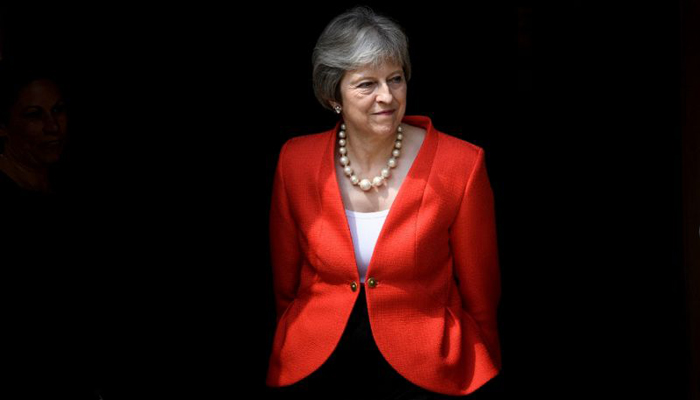Ex-minister backs new Brexit vote as eurosceptics pressure May
July 16, 2018

British Prime Minister Theresa May drew fire from all sides Monday over her Brexit strategy as a former minister described it as a 'fudge' and called for a second EU referendum, and eurosceptics readied a parliamentary challenge.
Former education secretary Justine Greening, who opposed Brexit, said May´s plan to follow European Union rules on trade in goods without being able to influence them was "the worst of both worlds".
Noting the deep divisions in government and parliament on the way forward, Greening said the decision must be put to voters -- becoming the most senior member of May´s Conservative party to back the idea.
"The only solution is to take the final Brexit decision out of the hands of deadlocked politicians, away from the backroom deals, and give it back to the people," she wrote in an article in The Times.
May has repeatedly ruled out a second referendum, after Britons voted by 52 percent for Brexit in 2016, but Greening´s support for a so-called People´s Vote will give the campaign a huge boost.
Her intervention is also another blow for May´s plan for close ties with the EU, which had already come under fire from Conservatives who want a clean break.
Two top ministers, Boris Johnson and David Davis, quit in protest last week followed by a string of junior walkouts, including another on Monday.
Eurosceptics will have a chance to show their strength in the House of Commons late Monday by voting on amendments to a bill setting up a new customs regime after Brexit, which would effectively wreck May´s plan.
They are not expected to pass, as the opposition Labour party will not support them, but will show how many MPs are prepared to publicly oppose the prime minister.
Meanwhile May will also test her plan with the EU this week, with Brexit negotiations due to resume in Brussels on Monday and the other 27 leaders due to hold their first talks on the proposal on Friday.
Split the party
The prime minister this weekend defended her plan, saying there was no alternative that protected trade in goods with the EU and avoided border checks in Ireland.
She insisted it would allow Britain to control migration, end the jurisdiction of EU courts and forge its own trade policy -- despite US President Donald Trump saying it could 'kill' a US-UK trade deal.
But eurosceptics believe it keeps Britain too close to the EU, and Davis, the former Brexit secretary, warned in the Financial Times on Monday it would deny the government the "freedom to run our own economy".
"It would be profoundly dangerous to leave the EU but remain subject to regulations made by institutions in which we have no say," he wrote.
In an article in the Mail on Sunday, May urged eurosceptics to keep their "eyes on the prize", warning: "If we don´t, we risk ending up with no Brexit at all."
Pro-Europeans are also unhappy, including with the plan for loose ties with the EU on Britain´s dominant services sector, and former prime minister Tony Blair said it would lead to a "confused outcome".
Some MPs have tabled an amendment to the Taxation (Cross-border Trade) Bill, also known as the customs bill, seeking a new customs union with the EU, which May has strongly rejected.
Jacob Rees-Mogg, the leader of the powerful European Research Group of eurosceptic Conservative MPs, warned May´s approach would split her party.
He accused the prime minister of never having given up her support for staying in the EU, telling the BBC on Sunday she was "a Remainer who has remained a Remainer".
Rees-Mogg said she still had time to change course, but said the current plan would only go through parliament with the support of opposition votes.
"The inevitable consequence of the parliamentary arithmetic is that she will need to change it to keep the party united," he told BBC television.











